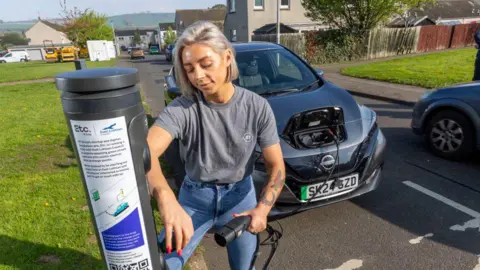
 BT Group
BT GroupBT has abandoned its scheme to turn green street cabinets into electric vehicle (EV) charging points having completed only one of the 60,000 conversions it initially said it was aiming for.
The metal cases, seen on streets around the UK, are usually used for phone and broadband cables.
When it announced the project in January 2024, BT said repurposing the cabinets was a “unique opportunity” to address a “key barrier” to people switching away from petrol and diesel cars.
However, the scheme has now been scrapped with the firm saying it will be focussing on “the Wi-Fi connectivity challenge surrounding EV’s” instead.
“It’s disappointing that it’s not going to proceed,” Stuart Masson from automotive website The Car Expert told BBC News.
“The good news that we are seeing in the industry is that the overall rollout of electric charging points is accelerating faster than had been predicted a couple of years ago,” he added.
However, he said that most of the charging points are in busier areas rather than on streets nearer to people’s homes, meaning BT’s decision was still a setback.
Mr Masson welcomed its pledge to improve wi-fi infrastructure around EV charging points.
“It’s very frustrating when you turn up to a charging point, you go to log into the app… and you can’t get a connection because you’re buried in a multi-storey car park somewhere and there’s no signal,” he said.
“If BT can make a dent in that then that would be really good.”
Scheme falls flat
Many green cabinets are coming towards the end of their lifespans as BT upgrades to fibre broadband.
But only one of them, in East Lothian, was ever actually turned into a public charging point.
It will now close in February, according to The Fast Charge newsletter, which broke the story.
The charger currently shows as “out of order” on the Evve Charge app, which shows the locations of EV chargers in the UK.
East Lothian Council has been contacted for comment.
A BT Group spokesperson said the trial tested “a great deal about the challenges that many on-street EV drivers are facing with charging and where BT Group can add most value to the UK EV ecosystem.”
They added: “Other emerging needs we’ve identified include the wi-fi connectivity challenge surrounding EV’s – our pilots will now shift in focus to explore this further.”
The government has set a target of 300,000 public charging points by 2030.
Its own statistics show there are 73,334 public charging devices in the UK – a 37% increase on a year ago.
Nearly a third of these are in Greater London, according to EV charging company Zapmap.
The Department for Transport responded to BT’s decision by stressing that 2024 was “a record-breaking year for EV infrastructure,” with nearly 20,000 EV charging points added in the past 12 months.
“This comes alongside £6bn of private investment in the pipeline by 2030, helping EV owners drive with the confidence that they will never be too far away from a chargepoint,” it said in a statement.
The car industry however has voiced concerns about the speed with which the UK is attempting to transition to EVs.
Ford said in November 2024 that the government’s timetable for moving away from internal combustion engine cars would not work without further financial incentives.
The following month the government launched a consultation with the automotive and charging industries to shape its phase-out of petrol and diesel cars.
It said it had invested £2.3bn to support the switch to EVs, as it reasserted its target to stop sales of new fossil fuel-powered cars by 2030.


Be the first to comment